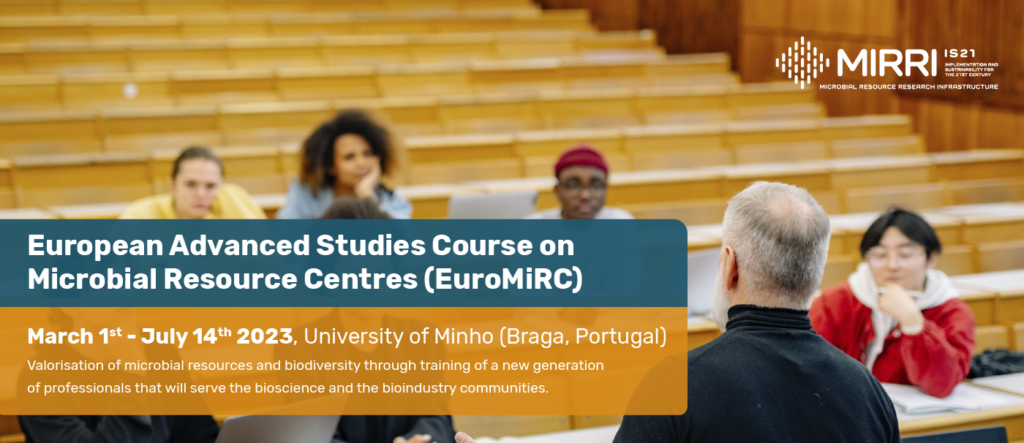
Applications to the EuroMiRC Advanced Studies Course first edition will soon be open – applicants can submit their proposals from February 6th to February 15th, 2023.
Course fees for the first edition can be waived under the IS_MIRRI21 project! (See eligibility criteria here)
The European Advanced Studies Course on Microbial Resource Centres (EuroMiRC) aims to create a new generation of highly qualified professionals that will work in microbial Culture Collections (CC) or in the more advanced concept of Microbial Resource Centres (mBRCs).
The teaching body of this Advanced Studies Course assembles a critical mass of microbiologists with long and internationally recognised research, innovation, and education experience, belonging to different CC/mBRCs that are partners of the Microbial Resource Research Infrastructure-European Research Infrastructure Consortium (MIRRI-ERIC). The prepared curricular programme is designed to give science professionals the skills and knowledge they need to take on greater responsibilities on the management of microbial resources.
General objectives of EuroMiRC:
EuroMiRC intends to impact beyond the borders of CC/mBRCs by covering competencies required at different phases of the CC/mBRCs lifecycle. The EuroMiRC curricular programme is designed to:
- integrate scientific competences and management skills to access, preserve and supply microbial genetic resources and other related services;
- disseminate skills on management of Microbial Resources Centres under quality control standards and in compliance with the legal frameworks;
- appraise the valorisation chain of the microbial diversity long-term preservation.
What will the programme cover?
The EuroMiRC curricular programme actively encourages lifelong learning and interactions among students and CC/mBRCs staff. This will create among the alumni the sense of belonging to a professional community that shares common approaches and language, and that is knowledgeable in scientific and bioindustry areas in which specific CC/mBRC outperform. By the end of this course, students will be able to:
- explain the role of CC/mBRCs resources as an asset for the advancement of life sciences and biotechnology;
- describe the most frequent long-term microbial preservation methods;
- formulate strategies to implement a long-term microbial preservation plan;
- design operation strategies taking into consideration the long-term impact of quality control and risk assessment at CC/mBRC;
- implement strategies on CC/mBRC to fitness for the intended purpose under different legal, standards and regulatory requirements;
- recognise the different options to apply information technologies and data management tools to CC/mBRC.
Who should apply?
The EuroMiRC vision is to develop a new generation of CC/mBRCs professionals who recognise the necessity of undergoing advanced training to acquire state-of-the-art technical and managerial skills tailored to provide and perform better CC/mBRCs services to the user communities. EuroMiRC is primarily aimed at:
- Doctoral students (3rd cycle);
- Post-doctoral researchers;
- and any professionals that want to acquire high-level international and management-oriented competencies on Microbial Resources Centres.
How will EuroMiRC function?
The course is hosted by University of Minho (Braga, Portugal) and will take place in blended learning (b-learning) format between March 1st and July 14th, 2023.
Find out more about the curricular programme, application procedure, eligibility criteria, and selection process of the EuroMiRC course here!
Submission deadline: 15 February 2023
